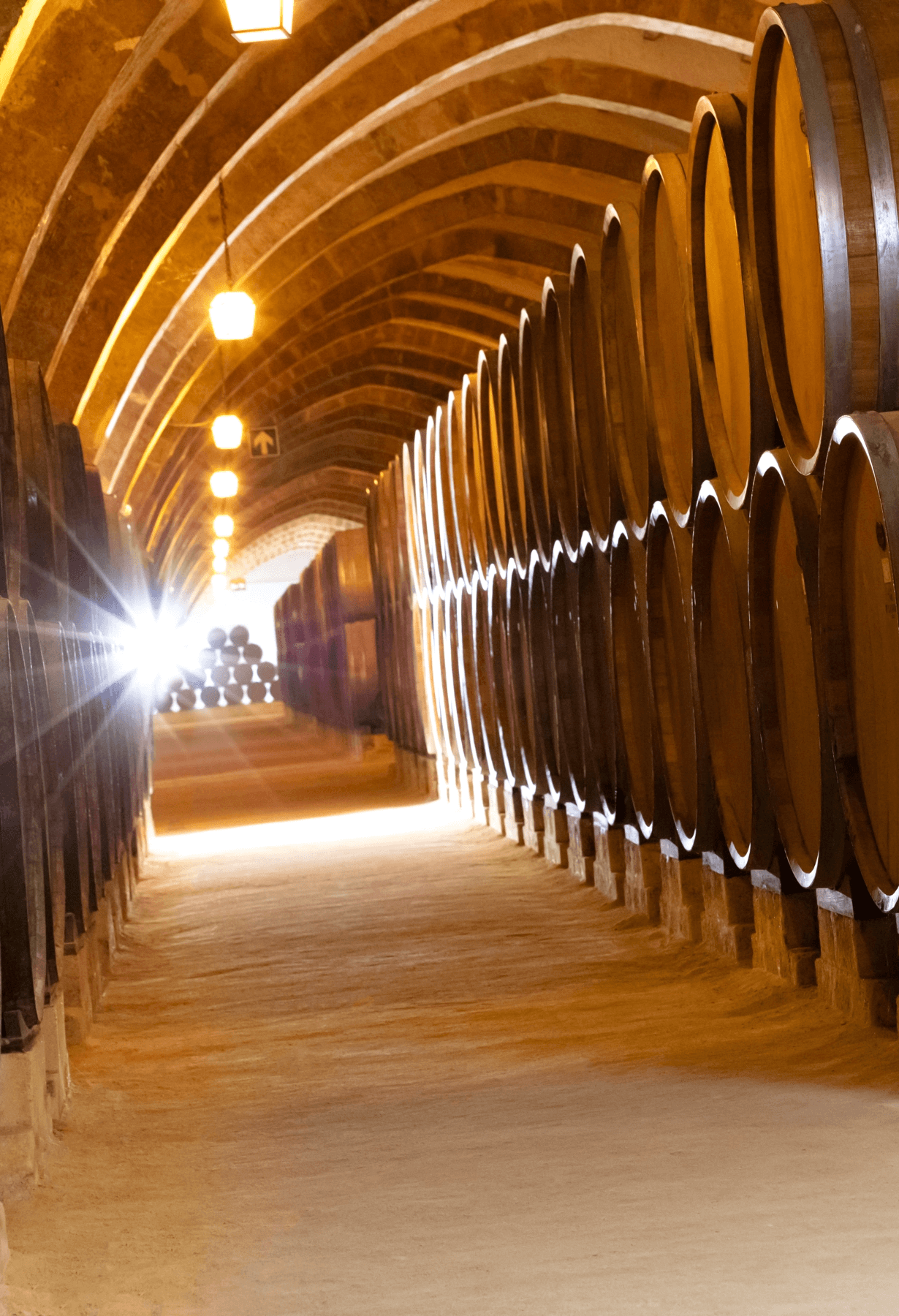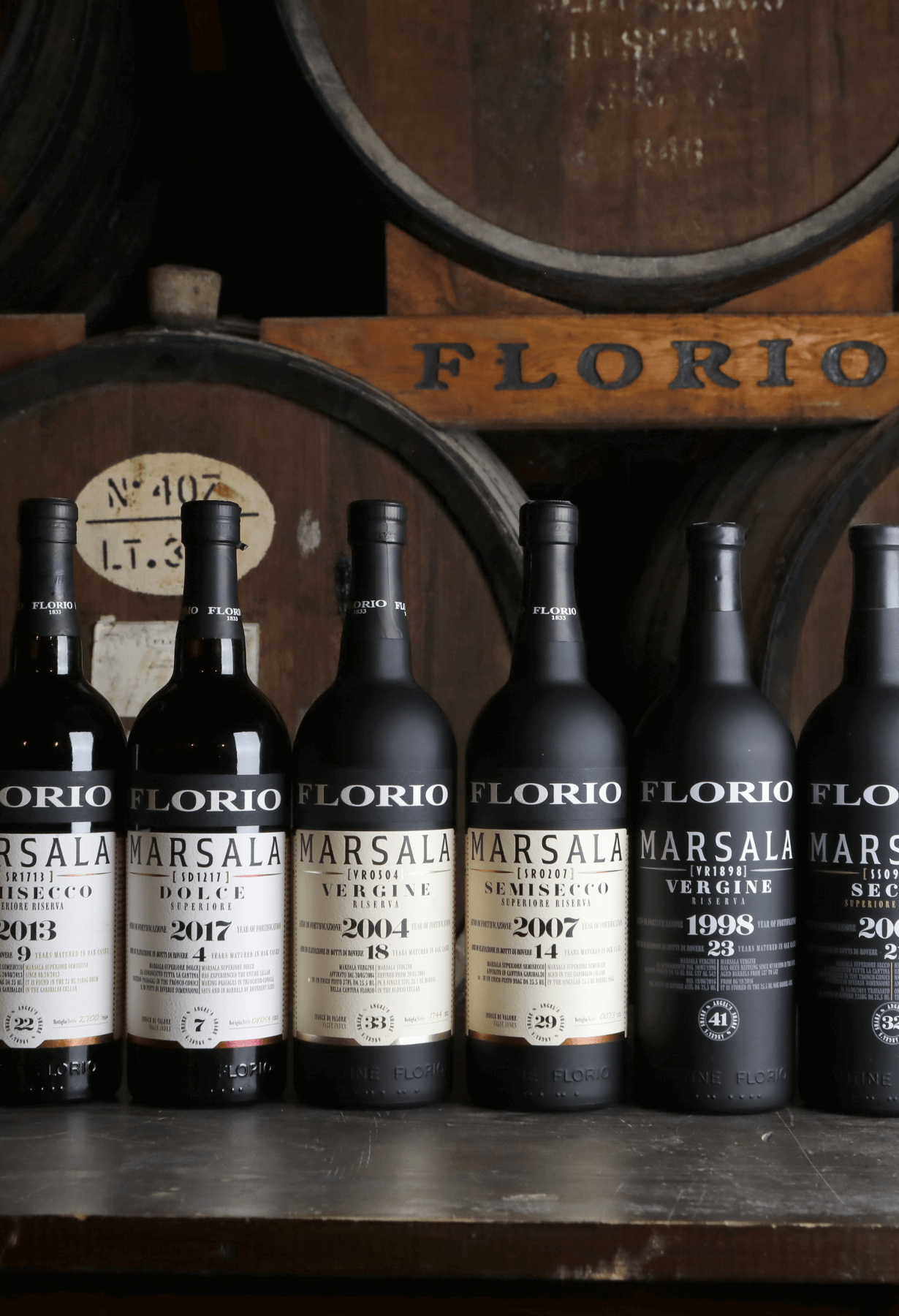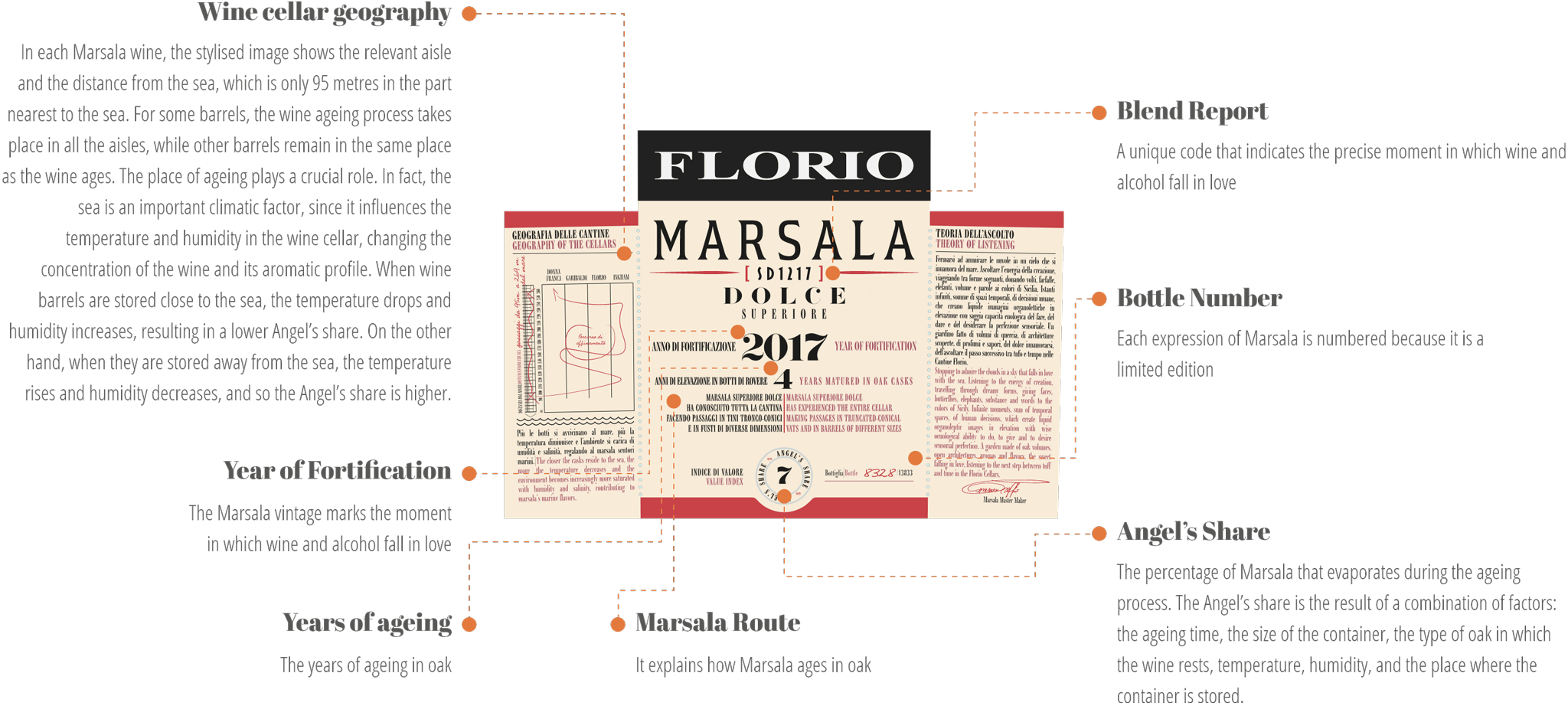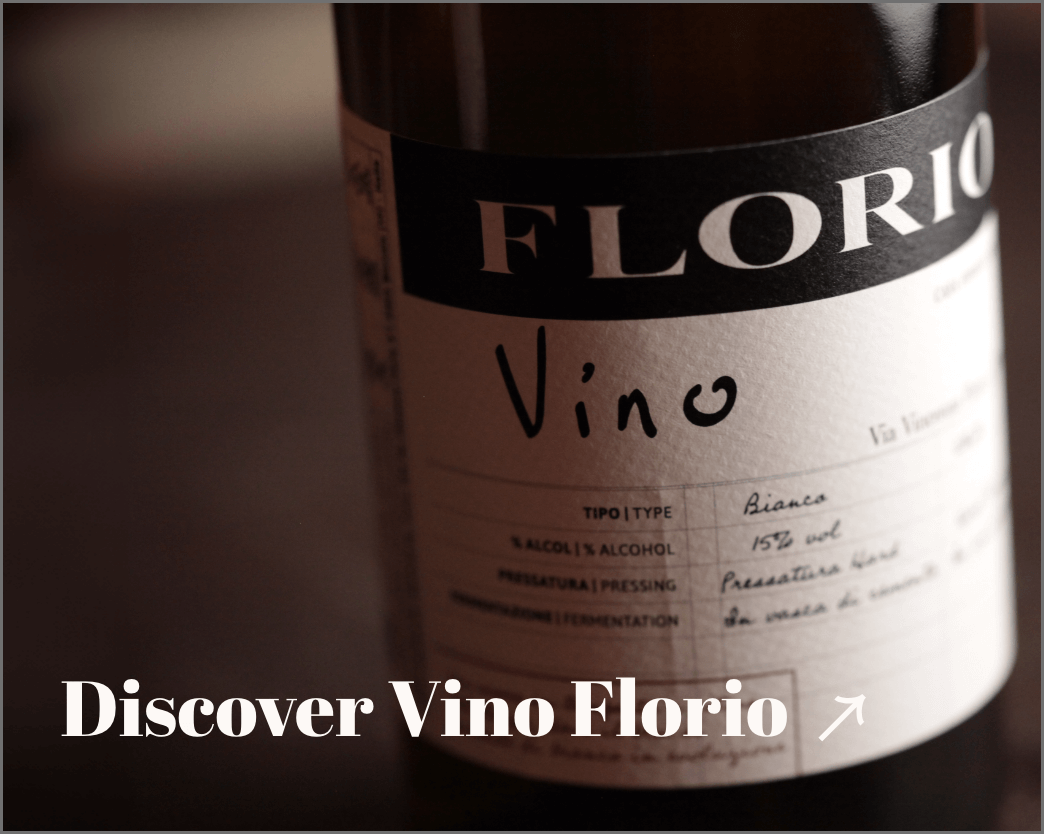Marsala Florio
Marsala Florio
The Historic Wine Cellars
Founded by Vincenzo Florio in 1833 in Marsala, Western Sicily, the Florio Wine Cellars gaze out towards the sea. With grapes caressed by breezes and flavourful due to the proximity to the sea, the magnificent and silent Florio Wine Cellars house the oak barrels where the Marsala Florio wines age, seemingly motionless. Hundreds of barrels, vats and wooden kegs, each holding its own story, breathe the sea through the tuff-stone floor, in the high aisles where scents and architecture blend. This wonderful place is the theatre where the Sicilian idea of beauty is distilled, and our oenologist – through the wise use of space, time and oxygen – creates Marsala wine by slowly blending all its sensorial potentials.

Grapes, terroir and extreme winemaking
Each harvest is the result of ancient knowledge, which brings grapes to the cellar ready to be vinified forcefully, in a complex, surgical process. When creating an evolutionary style Grillo wine, classical soft winemaking gives way to a more robust approach, using extreme extraction of the must from the grape, with an instinctive management of fermentation temperature. The soul of Grillo turns into Vino Florio, a wine with a bold skeleton, unique in its kind and with an elegant mood, characterised by subtle marine hints of seaweed and salt. This wine, which is used to make Marsala DOC wine, is the first step of a process through which our oenologist will create the Marsala Florio wines.
Vino Florio
Vino Florio is the wine used to make Marsala DOC. All Marsala wine categories originate from its various levels of fortification.


Falling in Love
Once fermentation is complete, Vino Florio is ready to ‘fall in love’, that is, to be combined with alcohol, which will then determine its organoleptic evolution.
The combination of wine and alcohol marks the official birth of Marsala winemaking.
‘Falling in love’ indicates the transition between the processes involved in making wine, which are shaped by their agronomic season, and those involved in making Marsala, marked by the succession of seasons during ageing in the wine cellar.
It is the christening of a ‘new creature’, Marsala, which grows and lives in the Florio Wine Cellars, in a heterogeneous climate, made of oak, time and human aspirations.
‘Falling in love’ is one of the most important decisions that the oenologist has to make, since it is during this ‘act’ that the type of Marsala is decided, trying to ‘imagine the impossible’, that is, the future of its organoleptic evolutions. The oenologist tastes, listens and ‘feels’ the batches of ‘Base wine with high alcohol content’ made after the harvest. For each one, the oenologist chooses the most suitable type of ‘falling in love’ (fortification) by using the tools at his disposal: ethyl alcohol of wine origin, mistelle* or cooked must*.
*MISTELLE (SIPHON): obtained by adding alcohol to the must to stop fermentation and preserve grape sugars (from grapes suitable for making Marsala wine).
*COOKED MUST: obtained by cooking the must (from grapes suitable for making Marsala wine) over direct heat for several hours.
The Marsala Florio wines
Marsala Florio wines speak of FALLING IN LOVE, TIME and PLEASANTNESS.
Falling in Love
Marsala Florio wine can be divided into Marsala Vergine and Marsala Superiore. Marsala Vergine is made from a combination of Vino Florio, alcohol and time. Marsala Superiore is made from a combination of Vino Florio, alcohol, mistelle*, cooked must* and time.
*MISTELLE (or SIPHON): It is exclusively used in the Superiore category to adjust the sugar content.
*COOKED MUST: It is only added to Marsala Superiore to give it an amber colour, enhancing its organoleptic complexity.
Time
Marsala Vergine is aged in oak barrels for at least 5 years, while Marsala Vergine Riserva is aged for at least 10 years.
Marsala Superiore is aged in oak barrels for at least 2 years, while Marsala Superiore Riserva is aged for at least 4 years.
Pleasantness
The pleasantness reflects the natural residual sugar content of Florio Marsala wines.
- Vergine: small amount of natural residual sugars from the fermentation process
- Secco: with a natural residual sugar content of up to 39 g/l from mistelle
- Semisecco: with a natural residual sugar content between 40 g/l and 100 g/l from mistelle
- Dolce: with a natural residual sugar content of more than 100 g/l from mistelle
Falling in Love
Marsala Florio wine can be divided into Marsala Vergine and Marsala Superiore. Marsala Vergine is made from a combination of Vino Florio, alcohol and time. Marsala Superiore is made from a combination of Vino Florio, alcohol, mistelle*, cooked must* and time.
*MISTELLE (or SIPHON): It is exclusively used in the Superiore category to adjust the sugar content. *COOKED MUST: It is only added to Marsala Superiore to give it an amber colour, enhancing its organoleptic complexity.
Time
Marsala Vergine is aged in oak barrels for at least 5 years, while Marsala Vergine Riserva is aged for at least 10 years.
Marsala Superiore is aged in oak barrels for at least 2 years, while Marsala Superiore Riserva is aged for at least 4 years.
Pleasantness
The pleasantness reflects the natural residual sugar content of Florio Marsala wines.
- Vergine: small amount of natural residual sugars from the fermentation process
- Secco: with a natural residual sugar content of up to 39 g/l from mistelle
- Semisecco: with a natural residual sugar content between 40 g/l and 100 g/l from mistelle
- Dolce: with a natural residual sugar content of more than 100 g/l from mistelle
Marsala Vergine
Marsala Vergine was born from the combination of a wine used to make Marsala DOC and alcohol.
Ageing in Oak
VERGINE: aged for at least 5 years.
VERGINE RISERVA: aged for at least 10 years.


Marsala Superiore
Marsala Superiore is the result of a combination of the wine used to make Marsala DOC wine, alcohol, mistelle and cooked must.
Ageing in Oak
SUPERIORE: aged for at least 2 years.
SUPERIORE RISERVA: aged for at least 4 years.


Place of Ageing
The Florio Wine Cellars are located on a two-hectare production area with tuff stone floors, lapped by the sea. More than 3,000 oak containers of different sizes are stored in four different climatic environments. Each aisle in the wine cellars tells the story of the artisan art of listening to wine and of a different complicity with the sea. Different temperatures and ‘salted’ humidity slowly feed the Marsala wines during their long ageing and maturing process. The sea is an important climatic factor, since it influences the temperature and humidity in the wine cellar, changing the organoleptic profile of the wine. When oak barrels are stored close to the sea, the ambient temperature drops and humidity rises. On the other hand, when they are stored away from the sea, the temperature rises and humidity decreases. The Florio Wine Cellars are influenced by seasonal changes, from blazing hot summers to rainy winters and sand-filled warm winds, which also affect the Marsala wines stored in oak barrels, giving rise to wines with different characters, nuances and colours.
The Wine Cellars and the oenologist have a deep level of understanding, which involves listening to the wines as they age in the Florio terroir.
Time
Time is irreplaceable and of the essence in the Florio Wine Cellars.
As seasons go by, Marsala Florio wines slowly develop, depending on the size and position of the container, until they reach their ultimate potential in terms of taste on the palate and until aged to perfection.
Angel’s Share

Listening Winemaking
Extreme winemaking: listening, and deep intimacy with the cellars, is vital to the liquid art of Marsala creation.
Ancestral skills and know-how, understanding grape ripening times, pressing times, ‘falling in love’ time, evolution in oak-wood time… all listened to, by the oenologist’s smoothly beating heart: the ancient whisper of Marsala.
Visceral art, carried out every day, for love and with love, conjured up by delicacy and intelligence… and well aware of creating something that many years later will tell our story to those who drink a glass of Marsala Florio.
The liquid art of Marsala
Above all else, Marsala is an artistic thought.
An act of love that embraces the idea of ‘creation’, paving the way for a temporal dimension that stretches infinitely. Each bottle of Marsala wine is intended for future consumption and is meant to last and continuously evolve, showing signs of growth and reaching a level of maturity that constantly balances nature and art, science and passion, magic and beauty.
The grape harvest, hard pressing, and the love story between wine and alcohol.
The place of ageing, the barrels used, and the distance from the sea.
Seasons that come and go, with prolonged ageing in oak.
In addition, frequent tastings and, most of all, the choices made by the oenologist who, using insight, traces one of the infinite paths that Marsala can take in order to reach full maturity.
The entire complex journey of Marsala towards expressing its individuality in the bottle is embodied in the Florio ‘narrative labels’ of the New Geography product line.

Cultural Label
For the first time ever in the history of Marsala wine, we decided to talk about the intimacy of the Florio Wine Cellars through ‘Narrative Labels’. A melody that can be heard among the aisles, the wood, and the various temperature and humidity levels, made accessible and comprehensible to the world through our new labels.



